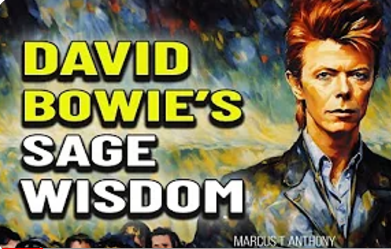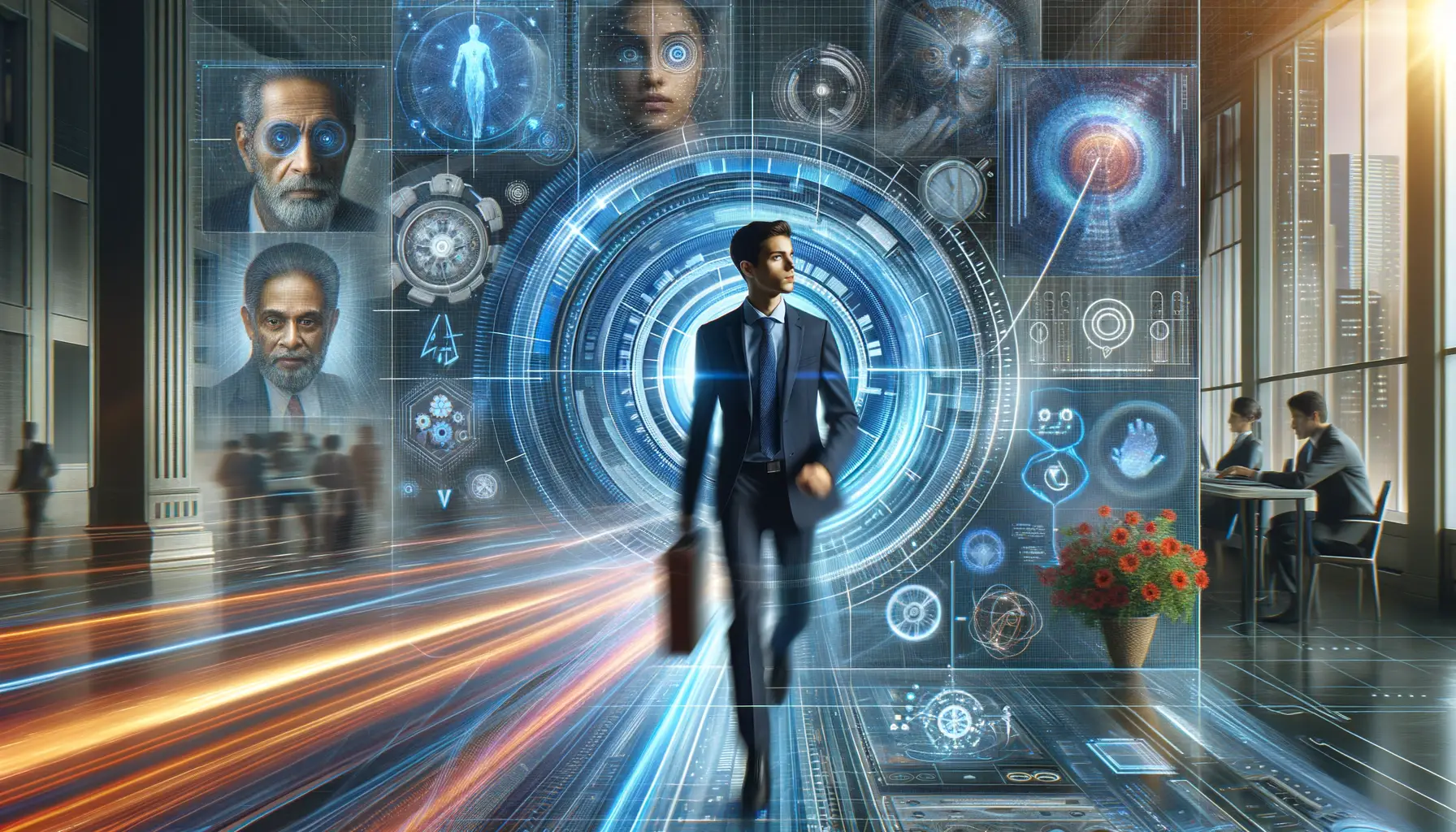“Never play to the gallery,” David Bowie once said in interview. But he was an older musician before he realized this profound truth. This is what he actually said about this in an interview.
Never play to the gallery. But you never learn that till much later in life… never work for other people at what you do… always remember that the reason that you initially started working was that there was something inside yourself that you felt that if you could manifest it in some way, you would understand more about yourself and how you coexist with the rest of society… I think it’s terribly dangerous for an artist to fulfil other people’s expectations. I think they generally produce their worst work when they do that…
David Bowie created innovative and very successful work right up till his final days. His twenty-fifth and last studio album, 2016’s Blackstar, was written and produced in Bowie’s late sixties, when he had already been diagnosed with liver cancer and was fast approaching his own death. He died just ten days after the album’s release. Blackstar was as groundbreaking and as very strange as anything the Thin White Duke had produced in his youth.
(You can watch the video version of this article on my YouTube channel)
Bowie also noted the following in that same interview.
The other thing I would say, if you feel safe in the area that you’re working in, you’re not working in the right area. Always go a little further into the water than you feel you’re capable of being in, go a little bit out of your depth and when you don’t feel that your feet are quite touching the bottom, you’re just about in the right place to do something exciting.
Bowie’s life is a wonderful example of a general and profound truth: that we do our best work when we know who we are, and do not seek to shape ourselves according to someone else’s rules. This is something I have had to consider again and again throughout my life and with my own work, including writing books, making videos like those on the Power and Presence Channel, and in my academic teaching and research. For example, when I first began to write Power and Presence around 2020, I toyed with the idea of removing as most references to the spiritual and esoteric. This consideration included my eliminating concepts like Integrated Intelligence, the extended mind and prayerfulness. My thinking was that if I framed this book in accordance with “the establishment” worldview, it would broaden the book’s appeal and help it reach a wider audience. Yet after reflection, I realized that I was ceding the frame to a mainstream perspective, and was too concerned about being criticized and rejected by readers who might rigidly scientific, reductionist perspective on the nature of the human mind and consciousness . After all, they might dismiss the book as “new age,” or the author (me) as deluded.
I was about to start playing to the gallery.
I quickly realized that if I did this, I would be giving my power away and betraying my Deep Self. If Power and Presence had been written from the establishment perspective, it would have ceded the frame to that worldview. I knew that in order for the book to work, it had to challenge the mainstream. It’s a book that must disturb the reader at some level. For right now we are a species that is in great need of being stirred, not in being told comfortable stories.
For whatever reason, I have been given the gift of intuitive perception. I am what psychologist Peter L Nelson calls a “seer.” Integrated Intelligence came naturally to me. I did not choose that gift. It chose me. I have been quite open about this for many years, and to try to hide it now would be an exercise in cowardice. In my work with other people I have seen that all humans carry this ability to some degree. What I have come to realise by working with others who have developed similar capacities, is that Integrated Intelligence is as much our birth right as the capacity for language or the ability to walk upright.
The price of authenticity
Despite the fact that embodying your Deep Self is ultimately the most rewarding path in life, we must all be mindful that honoring that Big-S-Self does not mean that you should recklessly expose yourself to the possibility of scorn and rejection. We all have to weigh the cost of openness and vulnerability. Some of us are more capable than others of taking life’s blows.
There may be a price to pay for challenging social and institutional taboos, and that cost may be great. When Muhammad Ali stated that he had thrown his Olympic boxing gold medal off the Second Street Bridge in Louisville and to the bottom of the Ohio River because a restaurant had refused to serve him (as a black man), many Americans saw the act as traitorous. Though doubts later arose about the authenticity of Ali’s story, we can assume that in telling the story Ali was trying to communicate something very important to him: that racism was still a part of American society and abhorrent to him as an African-American. Still, that did not protect him from the backlash that came. In the long-term Ali gained great respect, but we have to realize that such respect may take a long time, or it may never come at all.
In my own life, I chose to focus my academic research on the idea of Integrated Intelligence, “following my bliss” (so to speak) and beginning a doctoral degree at the University of the Sunshine Coast in Queensland, Australia. I was 36 years old at that time. Integrated Intelligence till that point had mostly been an embodied experience for me. I didn’t research it. I lived it. Or rather, it lived me. At the time of enrolment, I had spent almost a decade working with Integrated Intelligence, after my intuitive abilities had blossomed suddenly at the age of twenty-six. That was a spontaneous development which unfolded during meditation.
I had six years earlier begun a doctorate at the University of Newcastle, a higher ranking institution than the University of the Sunshine Coast where I eventually completed my doctoral studies. But I took leave of absence in 1996, when I moved to New Zealand to work for several years. When I resumed my doctorate, Newcastle accepted me back, but I instead chose to enrol at the Sunshine Coast to study under the supervision of one of the world’s best futurists, Sohail Inayatullah. Sohail was also keen to take on my preferred subject matter, Integrated Intelligence, a topic that lay way outside the bounds of the research domains of most traditional universities.
I thoroughly enjoyed working at USC under Sohail’s guidance, and I completed my doctorate with great enthusiasm in less than four years. But there was a price to pay for honoring my Deep Self. USC is in many ways a wonderful institution, set on an idyllic, rural campus with postmodern architecture and where kangaroos bounce around. But its international ranking is low. Also, the field I was about to study – Critical Futures Studies, which is closely related to Strategic Foresight – was not a well understood discipline in western academic systems (though that is changing now). Further, by focusing upon the rather esoteric subject of Integrated Intelligence in educational contexts, I added a third potential obstacle to my academic future.
Thus it was that over the following decade I was repeatedly rejected by all universities for any full-time position, as I outlined recently in a series of three videos – see the links in the description. That was difficult to take, and at one point, a few years after I had received the title of PhD, I became rather despondent about my career prospects. It seemed that I was destined to remain a high school teacher.
Yet ultimately, I lifted myself out of that depression and chose to see the entire exercise as something of an adventure. I wrote books and papers on topics I was passionate about it, attended conferences I was interested in, gave presentations to groups I felt could appreciate my message, and all while traveling to many locales across the Asia-Pacific region and meeting many wonderful people. I kept getting professionally rejected by the universities, but I chose to simply enjoy the process, releasing all expectation of the outcome. In David Bowie’s language, I typically played my own tune, not necessarily what others wanted to hear. But I should add that I did respect my audience, and listen to them. We all have to do that, to some degree.
Now, as regular visitors to this channel may know, I did eventually gain a full-time position at the campus of the Beijing Institute of Technology in Zhuhai, China in 2016. I was soon promoted to the title of Associate Professor of Foresight and Strategy, and although I am somewhat grizzled by the passing of time, that is a position I still hold today. The school is not Harvard or Oxford by any measure. But it is the most satisfying formal employment I have ever had, and my title grants me many professional and personal opportunities. And for that I am grateful. I am also a Foresight Consultant with the Higher School of Economics in Moscow, which is a little more mainstream, but I do enjoy the opportunity of working closely with their faculty and leaders. It does stretch me, but as David Bowie might say, if you aren’t doing something a little uncomfortable, you probably aren’t learning anything.
In letting go we can learn to relax enough such that we come to truly honour our Deep Selves. In each moment, we can make the choice to embody that Deep Self, regardless of whether or not we get what we want. We can choose to say “yes” to life, and be present to the people we are with and to the place where we find ourselves. Once we let go of judgment and blame, drama dissipates like a vampire exposed to sunlight in one of those old black and white horror movies. And we may be amazed to find our lives opening to presence, to a joy and gratitude that we never realized was there.
But it is also true that you may experience long delays in achieving your desires, and you may even experience much rejection and failure (as have I). Still, you can choose to release the outcome, and to see it all as an adventure, a means to learn how to realize your Deep Self. And once you have learned to stand in your power and master your own mind, no person or outcome can take that power away from you… Unless you let them.
Marcus




